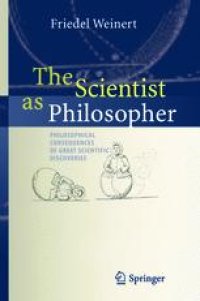
Ebook: The Scientist as Philosopher: Philosophical Consequences of Great Scientific Discoveries
Author: Dr. Friedel Weinert (auth.)
- Tags: Popular Science in Mathematics/Computer Science/Natural Science/Technology, Science general, Philosophy, Physics general
- Year: 2005
- Publisher: Springer-Verlag Berlin Heidelberg
- Edition: 1
- Language: English
- pdf
How do major scientific discoveries reshape their originators’, and our own, sense of reality and concept of the physical world? The Scientist as Philosopher explores the interaction between physics and philosophy. Clearly written and well illustrated, the book first places the scientist-philosophers in the limelight as we learn how their great scientific discoveries forced them to reconsider the time-honored notions with which science had described the natural world. Then, the book explains that what we understand by nature and science have undergone fundamental conceptual changes as a result of the discoveries of electromagnetism, thermodynamics and atomic structure. Even more dramatically, the quantum theory and special theory of relativity questioned traditional assumptions about causation and the passage of time. The author concludes that the dance between science and philosophy is an evolutionary process, which will keep them forever entwined.
How do major scientific discoveries reshape their originators’, and our own, sense of reality and concept of the physical world? The Scientist as Philosopher explores the interaction between physics and philosophy. Clearly written and well illustrated, the book first places the scientist-philosophers in the limelight as we learn how their great scientific discoveries forced them to reconsider the time-honored notions with which science had described the natural world. Then, the book explains that what we understand by nature and science have undergone fundamental conceptual changes as a result of the discoveries of electromagnetism, thermodynamics and atomic structure. Even more dramatically, the quantum theory and special theory of relativity questioned traditional assumptions about causation and the passage of time. The author concludes that the dance between science and philosophy is an evolutionary process, which will keep them forever entwined.
How do major scientific discoveries reshape their originators’, and our own, sense of reality and concept of the physical world? The Scientist as Philosopher explores the interaction between physics and philosophy. Clearly written and well illustrated, the book first places the scientist-philosophers in the limelight as we learn how their great scientific discoveries forced them to reconsider the time-honored notions with which science had described the natural world. Then, the book explains that what we understand by nature and science have undergone fundamental conceptual changes as a result of the discoveries of electromagnetism, thermodynamics and atomic structure. Even more dramatically, the quantum theory and special theory of relativity questioned traditional assumptions about causation and the passage of time. The author concludes that the dance between science and philosophy is an evolutionary process, which will keep them forever entwined.
Content:
Front Matter....Pages I-XI
Introduction....Pages 1-5
The Concept of Nature....Pages 9-74
Physical Understanding....Pages 75-102
The Block Universe....Pages 105-191
Causation and Determinism....Pages 193-276
Conclusion....Pages 277-282
Back Matter....Pages 283-342
How do major scientific discoveries reshape their originators’, and our own, sense of reality and concept of the physical world? The Scientist as Philosopher explores the interaction between physics and philosophy. Clearly written and well illustrated, the book first places the scientist-philosophers in the limelight as we learn how their great scientific discoveries forced them to reconsider the time-honored notions with which science had described the natural world. Then, the book explains that what we understand by nature and science have undergone fundamental conceptual changes as a result of the discoveries of electromagnetism, thermodynamics and atomic structure. Even more dramatically, the quantum theory and special theory of relativity questioned traditional assumptions about causation and the passage of time. The author concludes that the dance between science and philosophy is an evolutionary process, which will keep them forever entwined.
Content:
Front Matter....Pages I-XI
Introduction....Pages 1-5
The Concept of Nature....Pages 9-74
Physical Understanding....Pages 75-102
The Block Universe....Pages 105-191
Causation and Determinism....Pages 193-276
Conclusion....Pages 277-282
Back Matter....Pages 283-342
....